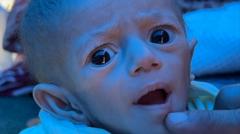In the war-torn streets of Gaza, the plight of a five-month-old girl named Siwar Ashour has drawn attention to the stark realities faced by families grappling with starvation under the Israeli blockade. As BBC correspondent Fergal Keane reports, Siwar's fragile existence encapsulates the despair experienced by many in the region, where hunger has become a norm.
Families wait in long queues for scarce food supplies, a situation that has become tragically familiar over nearly two years of continuous conflict. The brutal living conditions, heaps of rubble, and scattered makeshift shelters starkly illustrate the consequences of the Israeli military actions. A local cameraman, deeply impacted by the suffering around him, seeks to reconnect with Siwar, who had been hospitalized due to her severe malnutrition.
Despite recently being discharged from Nasser Hospital, Siwar remains critically underweight, prompting her mother Najwa to voice concerns about her daughter's deteriorating health. Having initially stabilized with a specialized formula, Siwar's situation has become increasingly desperate due to a lack of supplies and ongoing aid shortages. Najwa laments the adverse effects of the blockade on her ability to provide even basic necessities for her child.
The sound of war reverberates in the background of Siwar's fragile childhood, with drones and artillery fire a persistent reminder of the danger surrounding them. Najwa’s malnourishment during pregnancy has compounded the challenges faced, leaving her unable to breastfeed. With food and clean water scarce, obtaining essentials like diapers becomes a daunting task.
Amidst claims by Israeli officials of no food shortages, humanitarian organizations firmly counter these assertions, stressing that the aid flow has been critically inadequate. UN Secretary General Antonio Guterres has described current conditions in Gaza as among the most harrowing, with dire limitations on food, health, and clean water impacting millions.
As Najwa reflects on her family's grim reality, she feels time has collapsed into a struggle for survival, with no hope of future improvement. The situation for Gaza's inhabitants continues to reflect a tragic human crisis, a plight that has persisted through numerous attempts at ceasefire and resolution.
As the war persists, so does the suffering of families like Najwa's, framed by uncertainty and an overwhelming need for change.




















